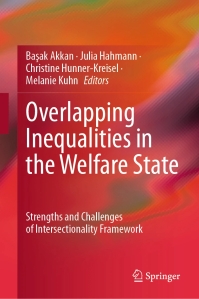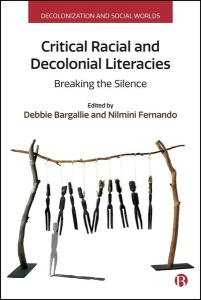I have published two new book chapters. In ‘Critical Race Studies and Intersectionality Responses to COVID-19,’ I provide practical guidance for educators and researchers on how to apply insights from the webseries, Race in Society. The series featured First Peoples scholars and practitioners, and other people of colour researchers discussing issues of race and the pandemic. In ‘Race at Work Within Social Policy,’ I analyse how anti-racism and intersectionality work is co-opted and suppressed in social policy. Read about both chapters below, including where to order the books and upcoming events.
Critical Race Studies and Intersectionality Responses to COVID-19
My book chapter, Critical Race Studies and Intersectionality Responses to COVID-19, is available to purchase now online as an individual chapter, or you can purchase the hardback book.
This chapter is published as part of the book, Overlapping Inequalities in the Welfare State. It’s edited by Dr Başak Akkan, Dr Julia Hahmann, Dr Christine Hunner-Kreisel, and Dr Melanie Kuhn, and published by Springer.
My chapter shows how race is a pervasive system that categorises and stratifies people in ways that maintain institutional and systemic inequality. Race has impacted the evolving management of public health responses to the Coronavirus (COVID-19) pandemic around the world. In Australia, state governments imposed harsh policing of migrant and refugee working class people that were not applied to white middle class people. The Government failed to meaningfully engage Aboriginal and Torres Strait Islander people in early public health planning, leaving communities who were at high risk from the virus to autonomously coordinate action without substantial state support. My chapter presents a case study of the webseries, Race in Society, co-hosted with Professor Alana Lentin. The series featured Aboriginal and Torres Strait Islander scholars and practitioners, and other people of colour researchers from Australia who examined public discourses of race and the pandemic. My chapter uses the concept of intersectionality to illustrate how the welfare state exercises multiple domains of power to maintain racial inequality, even during the public health crisis of COVID-19. My chapter provides guidance for educators and researchers on how to apply critical race perspectives into their own scholarship, teaching, and activism.
Race at Work Within Social Policy
My chapter ‘Race at Work Within Social Policy,’ is published in the book, Critical Racial and Decolonial Literacies: Breaking the Silence, edited by Dr Debbie Bargallie and Dr Nilmini Fernando. The short video below provides an overview.
My chapter demonstrates how poor racial literacy impacts social policy documentation, including policies attempting to implement anti-racism principles. Three case studies illustrate how white supremacy prevails: in a state strategy aimed at advancing Indigenous data sovereignty, policy meant to enhance service delivery for First Nations people, and an action plan seeking to increase disability inclusion in the public service. I explore how lack of racial literacy maintains what I term hegemonic diversity. That is, focusing on individualistic approaches to policy and practice, such as ‘celebrating’ individual differences, without dismantling racism and other structural inequities. I show how a racial literacy framework can enhance social policy.
You can purchase the book at 50% discount off the RRP when ordering via NewSouth Books. Email your order request to: renee.l.collins@newsouthbooks.com.au. Alternatively, you can purchase the eBook from Bristol University Press with 50% discount using code CNF24. It is also available on Kindle.
The book was launched on 20 September 2024, at Western Sydney University, on the lands of the Burramattagal People of the Darug Nation. Events in Brisbane and Melbourne to follow in October 2024.




